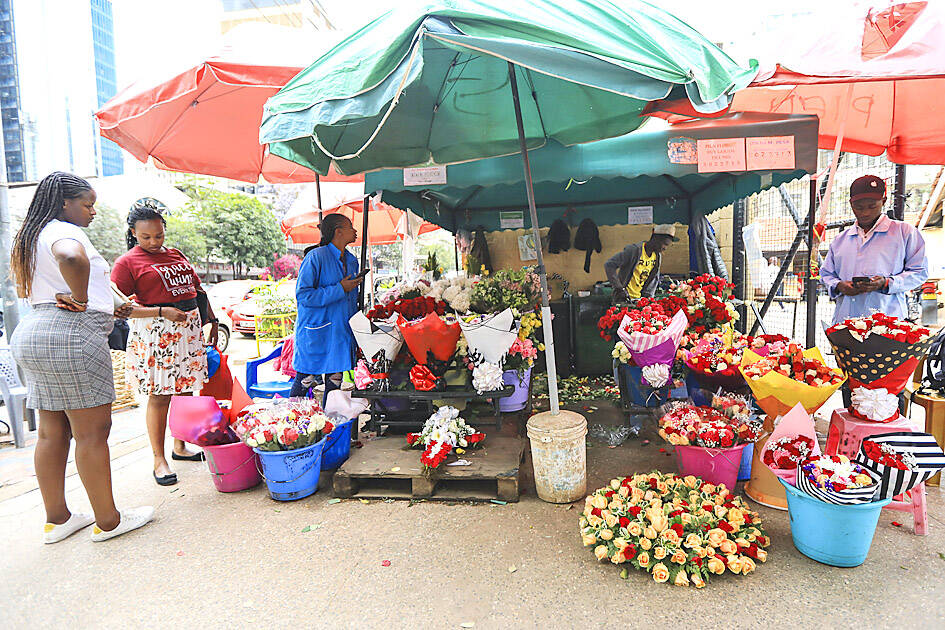One-third of all second-hand clothing shipped to Kenya in 2021 was “plastic waste in disguise,” creating a slew of environmental and health problems for local communities, a report released yesterday said.
Every year, tonnes of donated clothing is sent to developing countries, but an estimated 30 percent of it ends up in landfills — or flooding local markets where it can crowd out local production.
A new report shows that the problem is having grave consequences in Kenya, where about 900 million pieces of used clothing are sent every year, the Netherlands-based Changing Markets Foundation said.

Photo: EPA-EFE
Much of the clothing shipped to the country is made from petroleum-based materials such as polyester, or are in such bad shape they cannot be donated, the foundation said, adding that they might end up burning in landfills near Nairobi, exposing informal waste pickers to toxic fumes.
Tonnes of textiles are also swept into waterways, eventually breaking down into microfibers ingested by aquatic animals, it added.
“More than one in three pieces of used clothing shipped to Kenya is a form of plastic waste in disguise and a substantial element of toxic plastic pollution in the country,” the report said.
The research was based on customs data, as well as fieldwork by nonprofit organization Wildlight and advocacy group Clean Up Kenya, which conducted dozens of interviews.
Some of the clothing items were stained with vomit or badly damaged, while others had no use in Kenya’s warmer climate, the report found.
“I have seen people open bales with skiing gear and winter clothes, which are of no use to most Kenyans,” Clean Up Kenya founder Betterman Simidi Musasia said.
Up to 50 percent of all donated clothing was not of a sufficient quality to be sold on the local secondhand market, the report found.
Unwearable items might be turned into industrial wipes or cheap fuel for peanut roasters, swept into rivers, scattered around the market or sent to immense plastic graveyards outside the capital, such as the Dandora Landfill.
Several waste pickers working at Dandora reported breathing and asthma issues after inhaling smoke from burning plastic at the site, the report said.
Musasia said items should be better sorted at the point of donation before being shipped to Kenya, instead of being blindly passed on, to try and prevent the problem at the source.
Experts say the problem of clothing waste has been exacerbated by the fast fashion boom in wealthier nations, where items — many made from synthetic fibers — might be worn only a few times before being discarded.
The report called for the use of nontoxic and sustainable materials in textile manufacturing, and the establishment of more robust extended producer responsibility schemes around the world.
“The Global North is using the trade of used clothing as a pressure-release valve to deal with fast fashion’s enormous waste problem,” it said.

Kehinde Sanni spends his days smoothing out dents and repainting scratched bumpers in a modest autobody shop in Lagos. He has never left Nigeria, yet he speaks glowingly of Burkina Faso military leader Ibrahim Traore. “Nigeria needs someone like Ibrahim Traore of Burkina Faso. He is doing well for his country,” Sanni said. His admiration is shaped by a steady stream of viral videos, memes and social media posts — many misleading or outright false — portraying Traore as a fearless reformer who defied Western powers and reclaimed his country’s dignity. The Burkinabe strongman swept into power following a coup in September 2022

‘FRAGMENTING’: British politics have for a long time been dominated by the Labor Party and the Tories, but polls suggest that Reform now poses a significant challenge Hard-right upstarts Reform UK snatched a parliamentary seat from British Prime Minister Keir Starmer’s Labor Party yesterday in local elections that dealt a blow to the UK’s two establishment parties. Reform, led by anti-immigrant firebrand Nigel Farage, won the by-election in Runcorn and Helsby in northwest England by just six votes, as it picked up gains in other localities, including one mayoralty. The group’s strong showing continues momentum it built up at last year’s general election and appears to confirm a trend that the UK is entering an era of multi-party politics. “For the movement, for the party it’s a very, very big

ENTERTAINMENT: Rio officials have a history of organizing massive concerts on Copacabana Beach, with Madonna’s show drawing about 1.6 million fans last year Lady Gaga on Saturday night gave a free concert in front of 2 million fans who poured onto Copacabana Beach in Rio de Janeiro for the biggest show of her career. “Tonight, we’re making history... Thank you for making history with me,” Lady Gaga told a screaming crowd. The Mother Monster, as she is known, started the show at about 10:10pm local time with her 2011 song Bloody Mary. Cries of joy rose from the tightly packed fans who sang and danced shoulder-to-shoulder on the vast stretch of sand. Concert organizers said 2.1 million people attended the show. Lady Gaga

SUPPORT: The Australian prime minister promised to back Kyiv against Russia’s invasion, saying: ‘That’s my government’s position. It was yesterday. It still is’ Left-leaning Australian Prime Minister Anthony Albanese yesterday basked in his landslide election win, promising a “disciplined, orderly” government to confront cost-of-living pain and tariff turmoil. People clapped as the 62-year-old and his fiancee, Jodie Haydon, who visited his old inner Sydney haunt, Cafe Italia, surrounded by a crowd of jostling photographers and journalists. Albanese’s Labor Party is on course to win at least 83 seats in the 150-member parliament, partial results showed. Opposition leader Peter Dutton’s conservative Liberal-National coalition had just 38 seats, and other parties 12. Another 17 seats were still in doubt. “We will be a disciplined, orderly